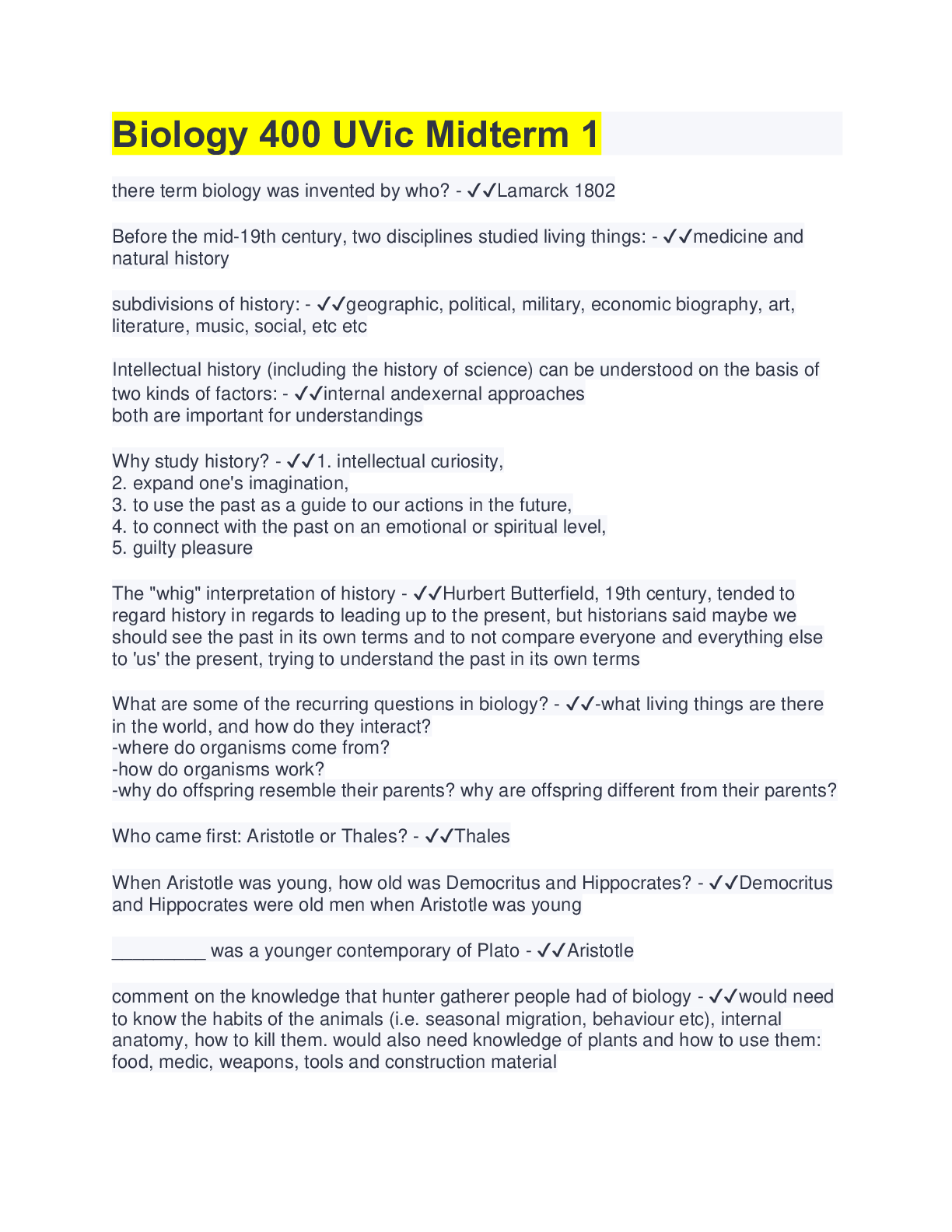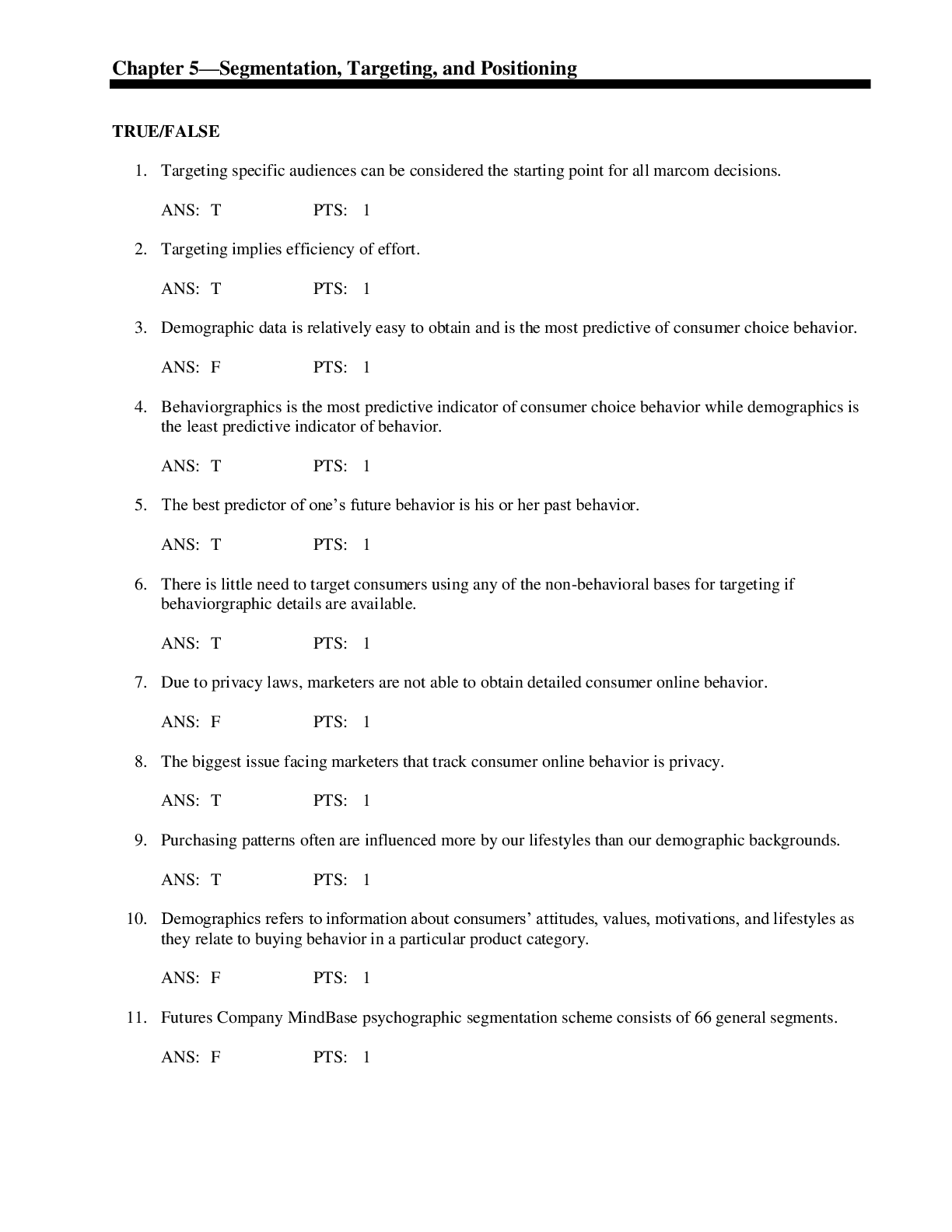History > QUESTIONS & ANSWERS > Biology 400 UVic Midterm 1, Questions and answers. Graded A+, 2022/2023 updates (All)
Biology 400 UVic Midterm 1, Questions and answers. Graded A+, 2022/2023 updates
Document Content and Description Below
Biology 400 UVic Midterm 1 there term biology was invented by who? - ✔✔Lamarck 1802 Before the mid-19th century, two disciplines studied living things: - ✔✔medicine and natural history sub... divisions of history: - ✔✔geographic, political, military, economic biography, art, literature, music, social, etc etc Intellectual history (including the history of science) can be understood on the basis of two kinds of factors: - ✔✔internal andexernal approaches both are important for understandings Why study history? - ✔✔1. intellectual curiosity, 2. expand one's imagination, 3. to use the past as a guide to our actions in the future, 4. to connect with the past on an emotional or spiritual level, 5. guilty pleasure The "whig" interpretation of history - ✔✔Hurbert Butterfield, 19th century, tended to regard history in regards to leading up to the present, but historians said maybe we should see the past in its own terms and to not compare everyone and everything else to 'us' the present, trying to understand the past in its own terms What are some of the recurring questions in biology? - ✔✔-what living things are there in the world, and how do they interact? -where do organisms come from? -how do organisms work? -why do offspring resemble their parents? why are offspring different from their parents? Who came first: Aristotle or Thales? - ✔✔Thales When Aristotle was young, how old was Democritus and Hippocrates? - ✔✔Democritus and Hippocrates were old men when Aristotle was young _________ was a younger contemporary of Plato - ✔✔Aristotle comment on the knowledge that hunter gatherer people had of biology - ✔✔would need to know the habits of the animals (i.e. seasonal migration, behaviour etc), internal anatomy, how to kill them. would also need knowledge of plants and how to use them: food, medic, weapons, tools and construction materialartificial selection in agriculture - ✔✔deliberate, selective breeding for altered characteristics treats that were selected during plant domestication: - ✔✔bigger seeds, plants that hold onto seeds longer, high yield, don't need a cold period for germination, self pollinate, not poisonous domestication of animals involved more or less knowledge? (compared to hunting) - ✔✔needed more knowledge. knowledge of nutrition, breeding, behaviour, diseases what are the subdivisions of medicine in early civilisation? - ✔✔pharmacology, surgery, magic and religion (usually done by different practitioners) In Egypt, how were physicians regarded social status wise? - ✔✔among the elite, and organised into a hierarchy, from chief physician to bandager Imhotep (2600 BC): who was he? - ✔✔architect, physician, polymath, might have written surgical texts. he was deified by the Egyptians after his death. Imhotep might be the source of the what greek god? - ✔✔Asclepios, the greek god of medicine what is the Edwin Smith papyrus? - ✔✔2700 BC might go back to Imhotep, discusses traumatic military injuries as case studies, has very little magic, some understanding of anatomy, speculates physiology, comments on contraceptives what is the Ebers Papyrus? - ✔✔1550 BC, both practical advice and magic, 700+ drugs and formulas, comes AFTER Edwin Smith papyrus what is the yellow EMperor's Inner canon? - ✔✔2nd century BC, ancient china, illness is the result of natural causes, illness not a result of supernatural (concept also seen in some medical approaches in Egypt and Greece), illness can result from the disruption of the flow of chi (chi travels through body in pathways called meridians) imbalance of yin and yang leads to what? - ✔✔illness what was the ancient Chinese Elements? - ✔✔five phases/elements: wood, fire, earth, metal water correspond to parts of mind and body, can be manipulated by physician for benefit of patientwhat was the ancient Chinese Elements? - ✔✔five phases/elements: wood, fire, earth, metal, water correspond to parts of mind and body, can be manipulated by physician for benefit of patient over 4,000 years ago, which two societies had zoos and botanical gardens? - ✔✔egypt and mesopotamia Menagerie - ✔✔a collections of animals to show wealth, prestige, collection, hobby zoo - ✔✔has some scientific interest to it- not mere show of wealth or collection Gardens and paradise - ✔✔intersecting canals that had the corners walled off, had gardens on them For the Greek philosophers, are science, philosophy, and religion distinct pursuits? - ✔✔no, there were intertwined who is credited with inventing science (broadly defined) and scientific curiosity? - ✔✔Greek philosophers- the Milesians Did religion play a roll in greek philosophers explanations of the world? - ✔✔No, the greek religion had no complete explanation for the world, the gods tool little interest in people, and priests did not dominate greek civilisation Who was in the Milesian School? - ✔✔Thales, Anaximander, Anaximenes Thales of Miletus - ✔✔~600 BC, left no writing, some of his views recorded by Aristotle (in Metaphysics- book), later greek philosophers regarded Thales as the first natural philosopher who is considered the first natural philosopher? - ✔✔Thales of Miletus what is science? - ✔✔ration argument, NOT supernatural, reason, observation and reasoning what is science? - ✔✔rational argument, NOT supernatural, reason, observation and reasoning Empedocles had a _____ (#) element model for nature: - ✔✔four What were Empedocles elements? - ✔✔fire, air, water, and earthEmpedocles thought that the elements combine and dissociate because of two forces: - ✔✔love (attraction) and hate (repulsion) Empedocles - ✔✔450 BC, had a materialist and causal view of nature, thought we think with our blood, random evolution (sometimes monsters sometimes beautiful) what is a primary difference in elemental views between thales and empedocles? - ✔✔thales- water is the only true element, empedocles- 4 elements Democritus - ✔✔400 BC, peak of first period of greek philosophy, interest in the natural world, learned of atomism from his teacher Leucippus, a religious skeptic, laughing Democritus' atomism - ✔✔he did not believe in 4 elements- he believed there were infinite number of elements, soul consists of fire atom [Show More]
Last updated: 2 years ago
Preview 1 out of 9 pages

Buy this document to get the full access instantly
Instant Download Access after purchase
Buy NowInstant download
We Accept:

Reviews( 0 )
$8.00
Can't find what you want? Try our AI powered Search
Document information
Connected school, study & course
About the document
Uploaded On
Sep 10, 2022
Number of pages
9
Written in
Seller

Reviews Received
Additional information
This document has been written for:
Uploaded
Sep 10, 2022
Downloads
0
Views
136
























